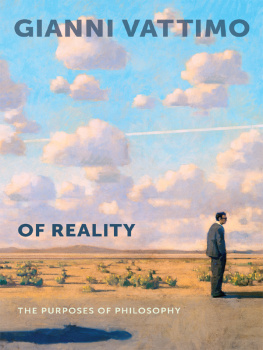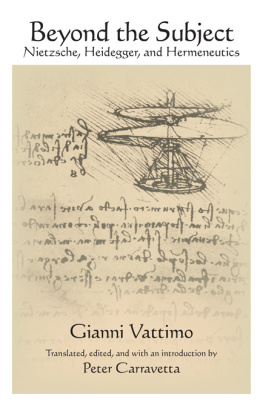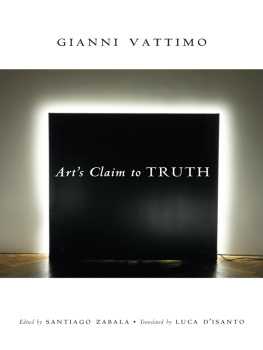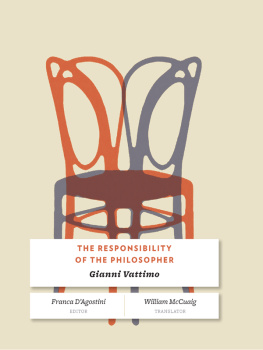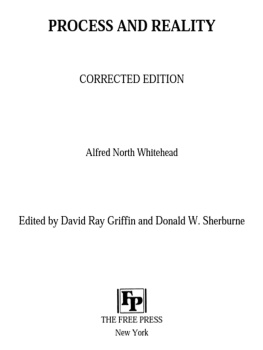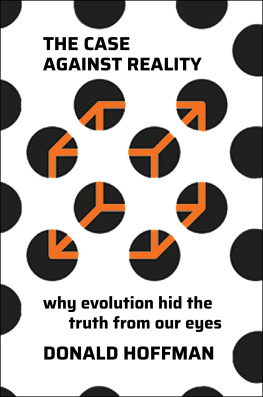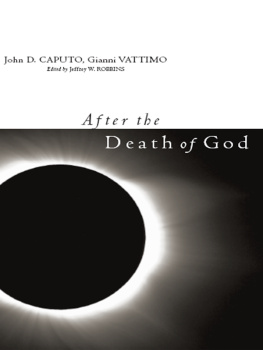OF REALITY
GIANNI
VATTIMO
[TRANSLATED BY ROBERT T. VALGENTI]
OF REALITY
THE PURPOSES OF PHILOSOPHY
COLUMBIA UNIVERSITY PRESS | NEW YORK
Columbia University Press
Publishers Since 1893
New York Chichester, West Sussex
cup.columbia.edu
Della realt 2012 Garzanti
English translation copyright 2016 Columbia University Press
All rights reserved
E-ISBN 978-0-231-53657-8
The translation of this work has been funded by SEPS
Segretariato Europeo per le Pubblicazioni Scientifiche
Via Val dAposa 7 40123 Bologna Italy
seps@seps.it www.seps.it
Library of Congress Cataloging-in-Publication Data
Vattimo, Gianni, 1936
[Della realt. English]
Of reality : the purposes of philosophy / Gianni Vattimo; translated by Robert T. Valgenti.
pagescm
The Gifford lectures.
Includes bibliographical references and index.
ISBN 978-0-231-16696-6 (cloth : alk. paper)ISBN 978-0-231-53657-8 (e-book)
1.Philosophy, Modern. I. Title.
B794.V3813 2016
110dc23
2015016428
A Columbia University Press E-book.
CUP would be pleased to hear about your reading experience with this e-book at .
Cover and book design: Lisa Hamm
Cover image: Ben McLaughlin (contemporary artist)/Private Collection/ Wilson Stephens Fine Art, London / Bridgeman Images
References to websites (URLs) were accurate at the time of writing. Neither the author nor Columbia University Press is responsible for URLs that may have expired or changed since the manuscript was prepared.
For Sergio Mamino, in memoriam
Magnifice fecit Dominus nobiscum.
PSALM 125
CONTENTS
T his book, gathered around the two nuclei of lectures delivered at Leuven (1998) and Glasgow (Gifford Lectures, 2010), presents a long and rather unsystematic work of reflection on the theme of the dissolution of objectivity or of reality itself, which began with the first expressions of weak thought in the early 1980s. These lectures, aside from the relatively systematic intention that inspired themthe idea of presenting the meaning and results of my work to a larger philosophical audience and in more serious circumstances (in Leuven, in the Cardinal Mercier chair, where Gadamer years before had presented the core of Truth and Method, and also in Glasgow, in the prestigious series of Gifford Lectures)are only a few of the stages but not their true summae, perhaps as they could have been. As such, they are presented here, accompanied by some essays from the same years, edited only in the conference proceedings and the lectures for which they were conceived and written. I gave up on the idea of making them into a more systematic collection, which would avoid the almost physiological repetitions that occur in such cases. The readers will judge whether this decision made sense, as I believe it did. The differing weight of certain themesthe hermeneutic koin and its limits in the Leuven lectures, the temptation of realism in the Glasgow lecturesis the result of the temporal gap between the two lectures. In Leuven I was just returning from the lectures in Bologna, also collected in Beyond Interpretation (1994), which had initiated the identification of hermeneutics and nihilism as the heart of weak thought; in Glasgow, however, the adversary to combat then (and today more than ever) seemed to be the return to order that was felt in the culture, not only philosophical, during these most recent yearsthe effect perhaps of September 11? Or of the war against international terrorism? Or of the financial crisis that it seemed could only be defeated with a new realism that involved paying ones debts, working more and with lower salaries, and tightening ones belt?
I was not satisfied with Rortys response to Faras and his companions: by choosing to stand with Hitler in 1933, Heidegger behaved like a son of a bitch and made a condemnable moral choice; but what if Einstein had accepted the fascist party card? It would not have affected the validity of his theory in any way. Heideggers Nazism and the discussions sustained by books like the one by Faras are an event that held a double significance for the question of realism: on the one side, it referred to the reality within which philosophical theories stand and to which they cannot avoid being held accountable; and on the other, it seemed to me also to deny Rortys pacifying position, according to which one was able to distinguish between the validity of a philosophy and the morally reprehensible choices of its author. Moreover, Rorty conceived of philosophy as a redescription that held more or less the validity of a novel and was ultimately only an interpretation. But to me it seemed that neither philosophy nor perhaps even science itself was an objective form of knowledge of the reality out there, one that could be separated from the existential approach of the philosopher or of the scientist. Therefore, realism takes the political situation of the philosopher seriously, while antirealism admits that philosophy can be valid as a theory independently of the existential choices of the author.
The result of these two lines of reflectionwhich certainly now appear to me more homogenous than they might have at that timewas, on the one side, the loss of the technological illusion about the liberating capacity of the triumph of images, which were supposed to lighten the incontrovertability of the real; on the other side, the confirmation of the constant conviction that philosophy should not avoid involving itself in historical battles, even at the cost of horrible errors: I was thinking, for example, that the great thinkers of the 1920s and 1930sexcept for a man like Cassirer, rich promoter of the elite German Jew, almost naturally liberal and moderatewere generally marshaled up for causes: for every Nazi like Heidegger there were Stalinists like Lukcs and Bloch. Think about the famous seminar of 1930 held in Davos, where Cassirer the neo-Kantian faced off against Heidegger the existentialist (and not yet Nazi), inhabitant of the Black Forest and ultimately representative of the German proletariat that was ruined by inflation and longed for some type of redemption. There is no sympathy for Heideggers choice to be a Nazi, obviously. But there is a complete understanding of his decision to stand up. Even in the name of an erroneous self-interpretation. Heidegger was right to think of the situation of his epoch as a clash between powers, all of which were dominated by the frenzy of technics, in versions either capitalistic or communistic. And yet, by yielding to a late-classicist and preromantic mythology, he believed that Germany, precisely for its relative backwardness (which was such to the end of the eighteenth century and certainly much less evident in the twentieth century), might represent the site of a new pre-Socratic and premetaphysical Greece (as in the dreams of the young Nietzsche), and therefore also the alternative to the civilization of calculation, of rationalization, of totale Verwaltung, which the Frankfurt school was also discussing. (Moreover, what had then already struck me in Adorno was his clear conviction that Nazism was not over, that it would only be reincarnated in the mass society of America. A position that was ultimately not too far from Heideggers.)

